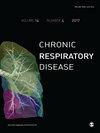Exploring the impact of comorbid dementia on exacerbation occurrence in general practice patients with chronic obstructive pulmonary disease.
IF 2.3
3区 医学
Q2 RESPIRATORY SYSTEM
引用次数: 0
Abstract
OBJECTIVE Previous studies have shown an increased risk of dementia in patient with COPD, but whether comorbid dementia modifies the risk of exacerbations in patients with COPD is unknown. We explored exacerbation occurrence in patients with COPD with comorbid dementia and compared this to patients with COPD without comorbid dementia. METHODS We performed a retrospective cohort study based on medical record data from 88 Dutch general practices. Patients diagnosed with COPD and comorbid dementia (n = 244, index group) were matched 1:1 to patients with COPD without comorbid dementia (n = 244, controls). Exacerbations were assessed 1 year before and 1 year after the dementia diagnosis (or corresponding date in controls) and compared between index and control groups by calculating Rate Ratios (RRs). RESULTS Average number of COPD exacerbations after dementia diagnosis increased from 5 to 14 per 100 patient years in the index group (RR = 2.70, 95%CI 1.42-5.09; p = 0.02) and from 17 to 30 per 100 patient years in the control group (RR = 1.74, 1.19-2.54; p = 0.04). These RRs did not significantly differ between the index and control groups (RR ratio = 1.55, 0.74-3.25; p = 0.25). DISCUSSION We conclude that although the risk of exacerbation increased after patients with COPD were diagnosed with dementia, their change in exacerbation risk did not seem to differ from the change observed in patients with COPD without comorbid dementia. However, as our study was hypothesis-generating in nature, further investigations on the subject matter are needed.探索合并痴呆症对全科慢性阻塞性肺病患者病情加重的影响。
目的以前的研究显示慢性阻塞性肺病患者患痴呆症的风险增加,但合并痴呆症是否会改变慢性阻塞性肺病患者病情加重的风险尚不清楚。我们对合并痴呆症的慢性阻塞性肺病患者的病情加重情况进行了调查,并与未合并痴呆症的慢性阻塞性肺病患者进行了比较。被诊断为慢性阻塞性肺病和合并痴呆症的患者(n = 244,指标组)与无合并痴呆症的慢性阻塞性肺病患者(n = 244,对照组)按 1:1 进行配对。在痴呆症诊断前 1 年和诊断后 1 年(或对照组的相应日期)对病情加重情况进行评估,并通过计算比率 (RR) 对指数组和对照组进行比较。结果在痴呆症诊断后,指数组每 100 个患者年的慢性阻塞性肺病平均加重次数从 5 次增加到 14 次(RR = 2.70,95%CI 1.42-5.09; p = 0.02),而对照组每 100 个患者年的慢性阻塞性肺病平均加重次数从 17 次增加到 30 次(RR = 1.74,1.19-2.54; p = 0.04)。我们的结论是,虽然慢性阻塞性肺病患者被诊断为痴呆症后,病情加重的风险会增加,但他们病情加重风险的变化似乎与未合并痴呆症的慢性阻塞性肺病患者的变化没有明显差异。不过,由于我们的研究只是假设性的,因此还需要对这一主题进行进一步的研究。
本文章由计算机程序翻译,如有差异,请以英文原文为准。
求助全文
约1分钟内获得全文
求助全文
来源期刊

Chronic Respiratory Disease
RESPIRATORY SYSTEM-
CiteScore
5.90
自引率
7.30%
发文量
47
审稿时长
11 weeks
期刊介绍:
Chronic Respiratory Disease is a peer-reviewed, open access, scholarly journal, created in response to the rising incidence of chronic respiratory diseases worldwide. It publishes high quality research papers and original articles that have immediate relevance to clinical practice and its multi-disciplinary perspective reflects the nature of modern treatment. The journal provides a high quality, multi-disciplinary focus for the publication of original papers, reviews and commentary in the broad area of chronic respiratory disease, particularly its treatment and management.
 求助内容:
求助内容: 应助结果提醒方式:
应助结果提醒方式:


